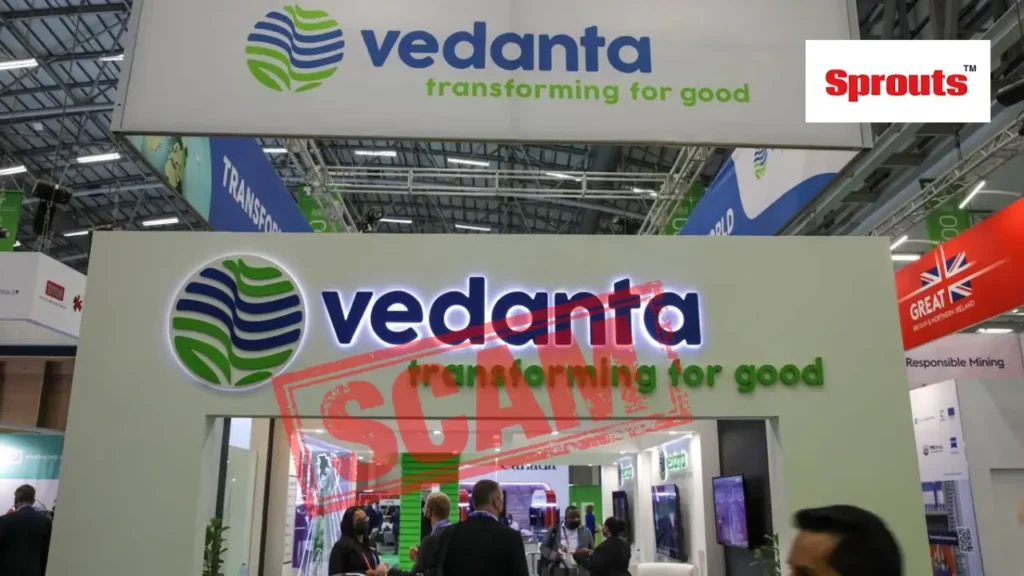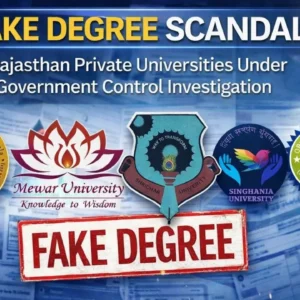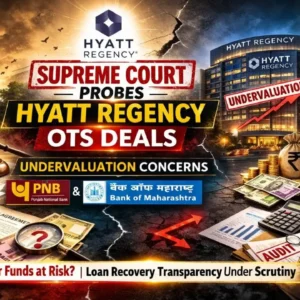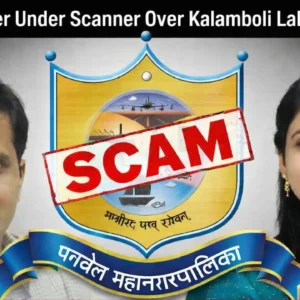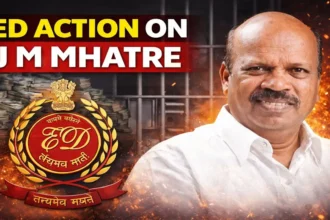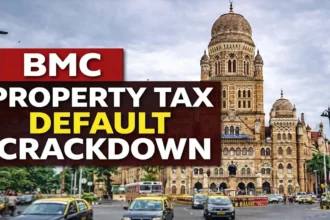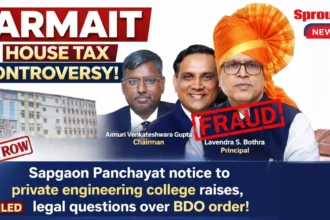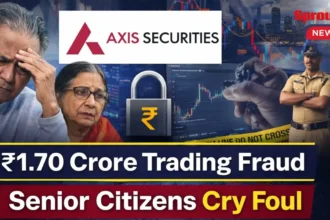ED Probes Vedanta’s ₹1,030 Cr Secret Refund
• Vedanta’s Hidden Brand Fee Scam
• Offshore Loans or Brand Fees?
• ICICI, Vedanta & FEMA Under Fire
Unmesh Gujarathi
Sprouts News Exclusive
Contact: +91 9322755098
- ED Probes Vedanta’s ₹1,030 Cr Secret Refund
- Hidden ED Inquiry into Vedanta Brand Fees Raises Red Flags
- ₹1,030 Crore Refund Quietly Made, Never Disclosed to Investors
- ICICI Bank’s Role Questioned in FEMA Lapses
- Ongoing Probe and Parallels to Xiaomi Case
- Vedanta’s Governance Crisis: Undisclosed Risks and Board Pressure
- Lack of Transparency Raises Market-Wide Concerns
- Regulatory Urgency Needed as Brand Fee Scandal Grows
A Viceroy Research report exposes Vedanta Ltd for secretly routing over ₹3,000 crore in brand fees to its debt-ridden parent, Vedanta Resources. Despite ED scrutiny and a ₹1,030 crore refund, no disclosures were made to investors or regulators. The Sprouts News Investigation Team (SIT) demands urgent regulatory action and transparency.
Hidden ED Inquiry into Vedanta Brand Fees Raises Red Flags
A bombshell report by U.S.-based forensic research firm Viceroy Research LLC has revealed that Vedanta Resources Ltd (VRL) and its Indian listed subsidiary Vedanta Ltd (VEDL) are at the centre of a covert Enforcement Directorate (ED) probe. The investigation, which began in July 2023, pertains to controversial cross-border remittances disguised as “brand fees”—a mechanism allegedly used to move interest-free funds from VEDL to its financially distressed parent company.
According to the Viceroy report, Vedanta’s CEO and CFO were summoned by ED in connection with these transactions. The remittances deviated from standard procedures—paid not annually at the start of the fiscal year, but sporadically when VRL faced liquidity shortfalls. This pattern triggered concerns over potential violations of the Foreign Exchange Management Act (FEMA) and raised corporate governance alarms.
Notably, VEDL CEO Sunil Duggal skipped the ED hearing, while recently appointed CFO Sonal Shrivastava and senior executive Ajay Agarwal attended. Just months later, Shrivastava resigned, shortly after participating in both the ED meeting and the company’s AGM. These events suggest deeper regulatory risks brewing beneath the surface.
Click Here To Download the News Attachment
₹1,030 Crore Refund Quietly Made, Never Disclosed to Investors
To avert immediate regulatory action, VRL allegedly refunded ₹1,030 crore (approximately US$123 million) to VEDL. This repayment, never publicly disclosed, appears to have been quietly recorded as a year-end adjustment—without informing shareholders, market regulators, or bond-holders.
According to Viceroy, these backdoor settlements have become routine, tacitly acknowledging non-compliance. The Sprouts News Investigation Team (SIT) notes that such hidden transactions not only violate transparency norms but also undermine investor trust and regulatory accountability.
These remittances, lacking contractual support, functioned as unsecured, circular funding to service Vedanta Resources’ offshore debt obligations, including its US$4.9 billion net debt and US$835 million annual interest burden. The report claims over ₹3,085 crore (US$361 million) was remitted in FY24-25 alone—representing 15% of VEDL’s net income.
ICICI Bank’s Role Questioned in FEMA Lapses
Viceroy has also raised serious concerns about ICICI Bank, the authorised dealer bank responsible for processing VEDL’s cross-border payments. It is alleged that ICICI Bank failed to conduct proper due diligence, approving high-value remittances without scrutinizing contracts or verifying economic rationale.
These actions, if confirmed, would directly contravene RBI’s FEMA compliance guidelines, suggesting lapses not just on Vedanta’s part, but also on the part of its financial intermediaries. Whistle-blowers cited in the report allege that ICICI never flagged any of these transactions, despite multiple red flags.
The Sprouts News Investigation Team (SIT) stresses that the implications extend beyond Vedanta, pointing to systemic gaps in India’s financial monitoring infrastructure. Regulatory capture and banking oversight failures may be enabling repeated misuse of FEMA exemptions.
Ongoing Probe and Parallels to Xiaomi Case
Despite the ₹1,030 crore repayment, ED’s investigation remains open. There has been no formal closure, no grant of legal immunity, and no public update by the regulator or the company. Viceroy cautions that the absence of further announcements should not be misinterpreted as resolution.
The report draws sharp parallels with the Xiaomi India case, where ED seized ₹5,551 crore routed as royalties—a move later upheld by the Karnataka High Court. If a similar action were to be taken against Vedanta, the financial and reputational fallout could be significant.
Vedanta’s Governance Crisis: Undisclosed Risks and Board Pressure
One of the most alarming findings is the non-disclosure of the ED probe and the refund to bond-holders during Vedanta’s debt restructuring discussions. Investors were reportedly misled to believe that brand fee arrangements were safe and that steel assets could be monetized for repayment. However, Viceroy claims the asset sale had already been shelved internally.
Moreover, the report accuses Vedanta of pushing through new brand fee contracts with both VEDL and Hindustan Zinc Ltd (HZL) without proper board approvals. In some instances, board members allegedly signed letters of assent under executive pressure, bypassing formal resolution procedures.
Such lapses in internal controls expose Vedanta’s governance structure to serious doubt. The Sprouts News Investigation Team (SIT) finds this especially concerning given the size of transactions and the company’s position as a major listed entity.
Also Read: Town Planning Dept Files FIR in Navi Mumbai Fraud.
Lack of Transparency Raises Market-Wide Concerns
Despite repeated red flags, Vedanta Ltd and Vedanta Resources have not issued any public statements in response to the allegations. Viceroy asserts that neither auditors nor the broader market were informed of the ED probe or the Rs1,030 crore refund—an omission that could breach disclosure norms under SEBI guidelines.
The continued reliance on the brand fee model—despite regulatory heat—suggests that VRL still sees it as a key liquidity tool, raising concerns about the financial fragility of intercompany arrangements. For minority shareholders, institutional investors, and policymakers, the situation presents a troubling mix of risk opacity and compliance gaps.
Regulatory Urgency Needed as Brand Fee Scandal Grows
As revelations from the Viceroy report gain traction, the pressure on Indian regulators to act decisively is mounting. The Vedanta episode underlines an urgent need for clearer norms on intercompany remittances, stricter FEMA enforcement, and transparent board-level governance.
With Sprouts News Investigation Team (SIT) closely tracking developments, this unfolding saga is expected to fuel calls for enhanced oversight of listed conglomerates and their cross-border transactions. The lack of accountability—if unaddressed—could erode investor confidence not just in Vedanta, but in the broader Indian corporate governance framework.


